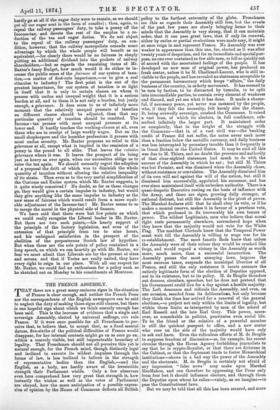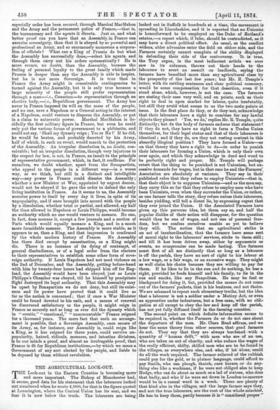THE FRENCH ASSEMBLY.
THAT there are a great many ominous signs in the situation of France is clear enough, and neither the French Press nor the correspondents of the English newspapers can be said to neglect the duty of making those signs still clearer, but there is one hopeful sign about which we think scarcely enough has been said. This is the increase of evidence that a single and sovereign Assembly, elected by universal suffrage, can rule France. If it were once possible for all Frenchmen to per- ceive that, to believe that, to accept that, as a fixed mental datum, five-sixths of the political difficulties of France would disappear, for her internal contests might go on as ours go on, within a scarcely visible, but still impenetrable boundary of legality. That Frenchmen should not all perceive this yet is natural enough, for the French mind, though distinctly legal and inclined to execute its wildest impulses through the forms of law, is less inclined to believe in the strength of representative bodies than the English,—and the English, as a body, are hardly aware of the irresistible
strength their Parliament wields. Only a few observers even here comprehend how very great that strength is, how instantly the wishes as well as the votes of Parliament are obeyed, how the mere anticipation of a possible expres- sion of opinion by the House of Commons deflects all British policy to the farthest extremity of the globe. Frenchmen see this as regards their Assembly still less, but the events of the past few years are slowly bringing home to their minds that the Assembly is very strong, that it can maintain order, that it can pass great laws, that if only its renewal, either by entire or partial re-elections were made easy, it might at once reign in and represent France. No Assembly was ever weaker in appearance than this one, for, elected as it was after twenty years of despotism, and for an immediate and special pur- pose, no one ever contained so few able men, or fell so quickly out of accord with the ascertained feelings of the people. It has developed no new man of original power, has produced no fresh orator, unless it be M. Challemel-Lacour, who is still in- visible to the people, and has revealed no statesman acceptable to the permanent bureaucracy which keeps "affairs," the daily business of the country, in orderly movement. It has seemed to be torn by faction, to be distracted by tumults, to be split into irreconcilable parties, to contain every element of weakness and discord, and yet see what it has done. It made a shame- ful, if necessary peace, yet never was menaced by the people, who, if they felt the necessity, felt keenly also the shame. It, being avowedly sovereign, crushed the Commune. It raised a vast loan, of which its electors, in full confidence, sub-
scribed infinitely the larger part. It maintained order so completely, that in the height of the struggle with the Commune—that is, of a vast civil war—the banking credit of France did not suffer, the notes never sank more than a fraction below the metallic currency, and daily business was less interrupted by pecuniary trouble than it frequently is in Great Britain or the United States. It may be said all this was due to M. Thiers, and no doubt the presence and authority of that clear-sighted statesman had much to do with the success of the Assembly in which he sat ; but still M. Thiers was but Premier, and was dismissed when the Assembly chose, without resistance or convulsion. The Assembly dismissed him of its own will and against the will of the nation, but still it dismissed him successfully, appointed his successor, and has ever since maintained itself with unbroken authority. There is a quasi-despotic Executive resting on the basis of influence with the Army, and there are signs, growing daily stronger, of national distrust, but still the Assembly is the pivot of power. The Marshal declares still that he shall obey its vote, or if he makes a mental reserve, makes it in favour of a previous vote,. that which professed to fix irrevocably his own tenure of power. The wildest Legitimists, men who believe that moral, right rests permanently elsewhere, surrendered hope when. they knew that the majority would not vote for the White. Flag. The maddest Clericals know that the Temporal Power must wait till the Assembly is willing to wage war for its- re-establishment. The most fanatic Reds know that unless the Assembly were of their colour they would be crushed like frogs, and would regard a victory in the Assembly as worth more, much more, than a successful insurrection. The Assembly passes the most annoying laws, imposes the most onerous taxes, suspends the municipal liberties of all France, and still the only resistance it meets assumes the entirely legitimate form of the election of Deputies opposed, not to its existence, but to its policy. M. de Broglie thunders out decrees, circulars, speeches, but he does not pretend that his Government could live for a day against a hostile majority. The Left denounce and ridicule the Assembly, and even, on• one occasion, seceded from its deliberatiois, but only because they think the time has arrived for a renewal of the general elections,—a project not only within the limits of legality, but within those limits as interpreted by men of the school of Earl Russell and the late Earl Grey. This power, more- over, so remarkable in politics, penetrates even social life. To be the friend or the relative of a powerful member is still the quickest passport to office, and a new orator who rose on the side of the majority would have only to ask and have. Even the ridiculous efforts of M. de Broglie to suppress freedom of discussion—as, for example, his recent circular through the Haves Agency forbidding journalists to say that he is crypto-Royalist, or that there are divisions in the Cabinet, or that the Septennat tends to foster Monarchical
institutions—shows in a bad way the power of the Assembly and the electorate. M. de Broglie is certainly not afraid of any impression " false news " may make upon Marshal MacMahon, and can therefore be oppressing the Press only from fear lest it should influence electors, and through them the Deputies upon whom he relies—vainly, as we imagine—to pass the Constitutional laws.
But we may be told that all this has been secured, and more especially order has been secured, through Marshal MacMahon and the Army and the permanent police of France,—that is, the bureaucracy and the agents it directs. Just so, and what better proof can you have that an Assembly in France can exercise sovereignty, than that it is obeyed by so powerful and professional an Army, and so enormously numerous a corpora- tion of officials ? What can a King of Prussia do but what the Assembly has successfully done,—select his agents, and through them carry out his orders systematically ? He is more secure, no doubt, than the Assembly, because the feeling of personal loyalty to the great family which made Prussia is deeper than any the Assembly is able to inspire, but he is not more Sovereign. It is true that in France the Army might in conceivable contingencies be turned against the Assembly, but it is only true because a large minority of the people still prefer representation through a man—i.e., Cassarism—to representation through an elective body,—i.e., Republican government. The Army has never in France imposed its will on the mass of the people, and no one, save a Napoleon or a General acting in the interest of a Napoleon, could venture to disperse the Assembly, or put in a claim to autocratic power. Marshal MacMahon is de- cidedly the first military figure in France, but even he could only put the various forms of government to a plebiscite, and could not say, Shall my dynasty reign ; Yes or No ?' If he did, he would be beaten, and probably deserted by his Army, half of which, in such an event•, would march to the protection of the Assembly. An irregular dissolution is, no doubt, con- ceivable; but an irregular dissolution, though very injurious to the respect for law, is not, in France, an insult to the principle of representative government, which, in fact, it reaffirms. For ourselves, we doubt whether, apart from the Bonapartists, who appeal to the people in a different way—in a worse way, as we think, but still in a distinct and intelligible way—any power in France could dismiss the Assembly ; whether a new Minister at War, appointed by urgent decree, would not be obeyed if he gave the order to defend the only living institution in France. As it seems to us, the Assembly accretes power to itself by every day it lives, in spite of its unpopularity, and if once brought into accord with the people by a dissolution, whether total or partial, and allowed, say half the time allowed to Napoleon or Louis Philippe, would become an authority which no one would venture to menace. No one, in fact, does menace it, except a few journals and a section of Paris which would equally menace a King, and in a much more formidable manner. The Assembly is more stable, as it appears to us, than a King, and that impression is confirmed by the whole modern history of France. No Assembly has there died except by assassination, as a King might die. There is no instance of its dying of contempt, of general disobedience, or of a legal order from the electors to their representatives to establish some other form of sove- reign authority. If Louis Napoleon had not used violence on the 2nd of December, and the Assembly, getting before-hand with him by twenty-four hours had shipped him off for Eng- land, the Assembly would have been obeyed, just as Louis Philippe's Chamber was obeyed, till he himself by precipitate flight destroyed its legal authority. That this Assembly may be upset by Bonapartists we do not deny, but still its exist- ence and its power have proved that it could live as far as the nation is concerned ; that if once a War Minister could be found devoted to his oath, and a means of renewal be discovered satisfactory to the people, it might reign in France as securely and as long as ever did the dynasty which in " erratic," " emotional," " unaccountable " France reigned for a thousand years. The mere fact that such an arrange- ment is possible, that a Sovereign Assembly, once secure of its Army, as, for instance, our Assembly is, could reign like a King, as it has reigned for three years, could survive un- popularity, hatred, ridicule, menaces, and intestine divisions, is to our minds a proof, and almost an irrefragable proof, that France is fit for Republican institutions,—by which we mean a Government of any sort elected by the people, and liable to be deposed by them without revolution.



































 Previous page
Previous page